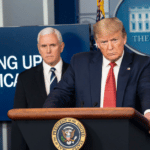





Vice President Kamala Harris exits the Democratic National Convention with increased momentum yet treads an uncertain path towards the upcoming election. Despite rising from the DNC with a visible boost, Harris confronts a challenging campaign landscape.
Politico reported that while she leads in most national and swing state polls, these advantages are marginal. Harris's ability to sustain this lead is a major concern within her campaign circles.
The Navigator Research's recent poll highlights the election’s competitiveness by showing Harris and Trump nearly tied across pivotal swing states.
This close race emphasizes the pre-election tension and underscores the uncertainties that lie ahead for Harris.
With debates against former President Donald Trump, the clock is ticking and Harris is running out of time to actually excite someone beside Democrat partisans.
As the election approaches, Harris has not committed to any public interviews as the Democratic nominee.
This decision comes amidst criticisms from Trump, who has pointed out Harris's struggles with media interactions. Her previous difficulty during a 2021 NBC News interview about her U.S.-Mexico border visit supports this point.
The upcoming debate on ABC News on September 10 between Harris and Trump introduces another layer of complexity to the campaign dynamic. Debate logistics, particularly regarding microphone control, have sparked contention between the two campaigns.
This issue resonates with past debate challenges and adds a tactical twist to the pre-debate preparations.
Trump, unconcerned about the microphone situation, expressed a preference for keeping it on.
This casual remark contrasts with the intense negotiations and preparations underlying the debate organization, reflecting different campaign approaches to public communication and media strategy.
Harris's camp has been notably quiet on detailing concrete policy positions.
This vagueness leaves Harris susceptible to Republican critiques, potentially undermining her campaign’s credibility and appeal. Analysts like Doug Herman assert that elaborating on her policies is essential for Harris to secure a broad mandate if elected.
This need for clarity in policy directions is amplified by Harris's attempt to distinguish her platform from that of President Joe Biden, as well as from more progressive stances she has advocated in the past.
Her strategic positioning thus becomes critical as she navigates the complex political landscape facing a Democratic candidate in this highly polarized environment.
Her campaign’s portrayal as an underdog intensifies the scrutiny of her every move and utterance.
Speakers at the DNC highlighted the challenges of her campaign, an acknowledgment that sets the tone for the tough road she navigates towards the election.
In response to past discrepancies in polling results, especially underestimating Trump’s performance, Democratic polling firms have unified efforts to enhance polling accuracy.
Trump's appeal remains strong among specific voter segments such as men and white demographics, where he outpaces Harris.
This polling data shapes both campaigns' targeted efforts as they seek to sway undecided voters and solidify their bases less than three months before voters head to the polls.
Throughout the campaign, advisors like Antjuan Seawright remind political strategists that while energy is abundant, it must be directed efficiently to yield positive results in the political realm. Managing this energy effectively is pivotal for Harris as she faces the challenges ahead.



